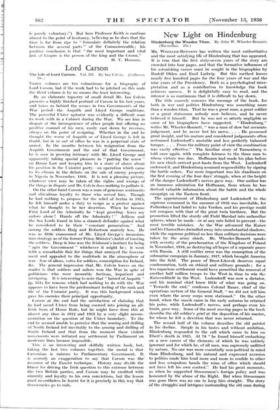Lord Carson
THREE volumes are too voluminous for a biography of Lord Carson, but if the work had to be pitched on this scale the third volume is by no means the least interesting.
By an elaborate tapestry of small detail Mr. Ian Colvin presents a highly finished portrait of Carson in his last years, and takes us behind the scenes in two Governments of the War period—the Asquith and Lloyd George coalitions. The powerful Ulster agitator- was evidently a difficult man to work with in a Cabinet during the War. We see him in despair at the incompetence of other people but offering no positive counsel of his own, easily cast down by reverses, always on the point of resigning. Whether in the end he thought the worse of Asquith or of Lloyd George is left in doubt, but in or out of office he was in a perpetual state of unrest. In the months between his resignation from the Asquith Government and the end of that Government, he is seen in growing intimacy with Mr. Lloyd George and apparently taking special pleasure in "putting the screw" on Bonar Law and keeping him in a state of alarm about his position in the Unionist party—an operation which came to its climax in the debate on the sale of. enemy property in Nigeria in November, 1910. It is not a pleasing picture, whatever view may be taken of the rights and wrongs of the things in dispute and Mr. Colvin does nothing to palliate it.
On the other hand Carson was a man of generous sentiments and chivalrous loyalty to those who served him. Though he had nothing to propose for the relief of Serbia in 1915, he felt himself wider a duty to resign as a protest against what he thought to be her desertion. When he became First Lord of the Admiralty he " kept growling—leave my sailors alone ! Hands off the Admiralty ! " Jellicoe and the Sea Lords found in him a staunch defender against what he considered to be their " constant persecution." And among the soldiers Haig and Robertson scarcely less. He was as little enamoured of Mr. Lloyd George's incursions into strategy as of the former Prime Minister's habit of trusting the soldiers. Deep in him was the Irishman's instinct for being " agin the Government " whichever it might be ; it went with a remarkable flair for things that annoyed the Govern- ment and appealed to the multitude - in the atmosphere of w►•ar--fear of aliens, votes for soldiers, conscription for Ireland, &c. like general impression that_Mr. Colvin leaves on the reader is that soldiers and sailors won the War in spite of politicians win) were incurably factious, impatient and intriguing. It is interesting to note that " hatred of Asquith " (p. 851) for reasons which had nothing to do with the War appears to have been the predominant feeling of the rank and file of the Unionist party. It was this background which gave his enemies their principal opportunity.
Carson at the end had the satisfaction of claiming that he had saved Ulster from being coerced into joining an all- Irish form of Home Rule, but he might have done this at almost any time in 1912 and 1913 by a very slight accom- modation on the question of the Ulster boundary. To the end he seemed unable to perceive that the arming and drilling of North Ireland led inevitably to the arming and drilling of South Ireland and that from the moment these violent movements were initiated any settlement by Parliament on moderate lines became impossible.
This is an interesting and skilfully written book, but, taking the last two volumes together, the moral is that Carsonism is ruinous to Parliamentary Government. It is scarcely an exaggeration to say that Carson was the inventor of the Fascist technique. History may divide the blame for driving the Irish question to this extreme between the two British parties, and Carson may be credited with sincerity and loyalty to his own convictions, but the lesson must .nevertheless be learnt for it is. precisely in this way that democracies go to ruin.














































 Previous page
Previous page